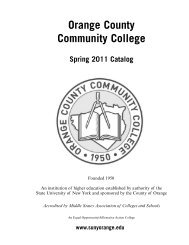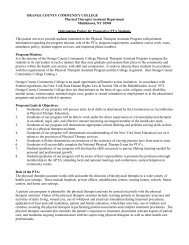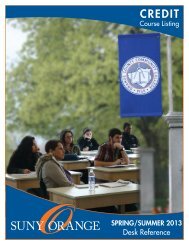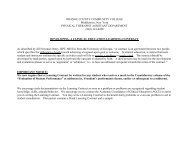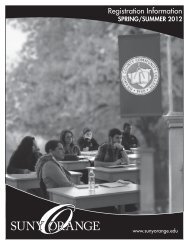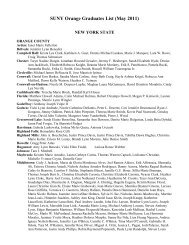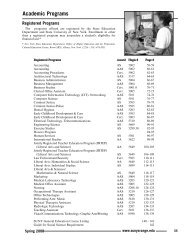Create successful ePaper yourself
Turn your PDF publications into a flip-book with our unique Google optimized e-Paper software.
Criminal Justice<br />
managerial and supervisory principles of<br />
administration as they relate to law enforcement<br />
agencies. The course will also review and critically<br />
assess police organizational ethics, corruption, police<br />
brutality, investigation and training.<br />
Prerequisite: CRJ 101<br />
CRJ 215—Criminal Investigation 1<br />
3 cr.<br />
This course provides an overview and introduction<br />
to basic criminal investigations. The course will<br />
provide instruction on proper note taking, report<br />
writing, interviewing techniques, crime scene searches,<br />
suspect identification, crime scene photography,<br />
composite sketch drawing, and court preparation.<br />
The investigative function and the relationship<br />
between investigators and the District Attorney are<br />
explored. Legal issues relative to the investigative<br />
function such as search and seizure, Miranda<br />
warnings, informant processing, undercover<br />
operations, wiretapping and surveillance are discussed<br />
and evaluated.<br />
Prerequisite: completion or concurrent enrollment<br />
CRJ 101<br />
CRJ 230—Criminal Justice Internship<br />
3 cr.<br />
This course provides students with an opportunity<br />
to acquire practical “hands-on” experience under the<br />
direct supervision of professionals in a field or area<br />
which interests them. The internship affords<br />
opportunities for academically related field work in a<br />
wide range of criminal justice, correctional,<br />
government agencies, social service programs, cultural<br />
organizations, businesses, research and non-profit<br />
institutions.<br />
The internship requires 80 hours of supervised field<br />
work and 15 hours of class work for a total of 95<br />
hours per semester.<br />
Prerequisite: Student must be a criminal justice<br />
major, have completed 30 credits or more, have a<br />
CumGPA of 2.5 or higher and have the permission of<br />
the department chair.<br />
CRJ 216—Criminal Investigation 2<br />
3 cr.<br />
The investigation of specific crimes and the<br />
exploration of methods utilized in specific criminal<br />
investigations. The course will explore specific crimes<br />
such as arson, narcotics, sex crimes, child abuse,<br />
domestic violence, assaults, burglary, larceny,<br />
homicide, auto theft, organized crime, domestic and<br />
transnational terrorist groups and cyber<br />
investigations. An emphasis on the types of evidence<br />
that are critical to the successful investigation of the<br />
above listed crimes will be thoroughly reviewed and<br />
analyzed. Court room preparation of these specific<br />
investigations will be thoroughly presented and<br />
discussed.<br />
Prerequisite/Corequisite: CRJ 101<br />
CRJ 226—Criminalistics<br />
2 lect., 2 lab., 3 cr.<br />
This course emphasizes the scientific investigation<br />
of crime. The importance of crime scene preservation<br />
and laboratory examination of forensic evidence as<br />
critical steps in the investigative process are<br />
emphasized. The processing of evidence in the field<br />
and laboratory are performed during in class lectures<br />
and in laboratory settings. Specific areas that will be<br />
covered during this class include crime scene searches,<br />
recording and securing forensic evidence, developing<br />
and recording latent fingerprints, examination of<br />
body fluids, microscopic examination of evidence<br />
such as ballistics, firearms, breathalyzer examinations<br />
and polygraph examinations etc.<br />
Prerequisite: CRJ 101, CRJ 215, and CRJ 216<br />
186 www.sunyorange.edu Spring 2012




